ID: Library shelves filled with books line the sides while a desk and two red chairs are the focal point.
After becoming a mother, I developed a renewed sense of appreciation for libraries, for more than just the variety of typical reasons, like borrowing books. I appreciated the small things first, perhaps the books they allow us to keep in our home well past their due dates. Then as a stay-at-home-mom, transitioning to a work-from-home-mom, libraries became my safe haven offering both entertainment (Yes! That thing called fun!) and education for my kids. We took full advantage of everything from toddler storytimes to preschool mindful movement classes. Moreover, it was where I felt most comfortable building community, bonding with other parents and finding playgroups.
Now, as a working mom, I appreciate the Lego building and crafting workshops. These provide me with a peaceful respite, a moment to tend to my work while observing from a desk that my girls are both productively and happily occupied. When asking my seven year old why she’s ‘drawn to the library’, she predictably responded with “The computers!”.
Of course we associate the library with books, but let's talk technology. This may seem antithetical, but the library computers with its educational games and software restricting web access, is a selling point that lets me feel secure. Why? Because I like to be strategic with my children’s screen time, and have them focus on content or games that give back to their educational journey rather than take-away from their self-confidence. Between that, and the endless books and activities, I feel grateful to always have a readily available go-to place for my family’s needs. But my love of libraries started young, long before I became a mom.
Growing up, my parents emphasized reading, pushing me and my siblings to read as much as possible. Although I've never asked them for the precise reasoning behind that desire, I suspect that they saw it as a stepping stone to, or a foundation for a ‘good education’. Like many immigrant parents, mine valued formal education and pushed us to excel academically. Some of my earliest memories up through middle school were going to the local public library a few times each month. We’d peruse the children’s and eventually the young adult sections, piling books into our orange library bag until it was practically spilling over.
"The strap dug into my shoulder with its weight and my younger sister would even have to hold the leftover books that didn’t fit. I still remember some of the wonderful novels and series I read during those formative years."

ID: Many books of different colors lined up.
The huge stack of books borrowed from the library were my only saving grace when I was grounded, which in my family meant no screen time during the only time it was typically permitted: the weekend.
One Monday morning, in the 4th grade after one of those weekends of "reading only", I turned in my reading log with 10 hours recorded on a Saturday alone. My teacher was in disbelief until I explained how that came to be.
"Although in my childhood reading was often associated with punishment, being forced to read regularly for long stretches of time still fostered a love of book, stories and narratives, within me."

ID: Young Black girl reading a colorful book.
I grew to look forward to and enjoy my protected reading time both in and outside of school, which is significant for students because “reading for pleasure has been shown to contribute to improved literacy outcomes” (Martinez, 2024). In my case I think the amount of reading I had done in my childhood, partially facilitated by my local public library, contributed to my work as a writer-editor with THENCE as well as becoming my extended family’s resident editor.
So, let's celebrate libraries. This year’s theme for National Library Week is ‘Drawn to the Library’. The American Library Association describes how ‘the library has something for everyone, helping us connect the dots from one part of our journey to the next’. I agree with that assertion; libraries do act as anchors for communities providing resources for all including homeschoolers, unhoused individuals, and senior adults. What's your library story? Will you share it with us? How can we better protect this public good? Write to me and the THENCE team using the form below. Happy reading!
References:
American Library Association. (n.d.). National Library Week. https://www.ala.org/conferencesevents/celebrationweeks/natlibraryweek
Otero Martinez, T. (2024, April 18). Investing in school libraries and librarians to improve literacy outcomes. Center for American Progress. https://www.americanprogress.org/article/investing-in-school-libraries-and-librarians-to-improve-literacy-outcomes/